As we start into 2018, we seize the opportunity of this post by Thomas Bierschenk and Jean-Pierre Olivier de Sardan on their influential edited volume States at Work to reflect on the state of the State in Africa, three years after its publication. The following books, all new political ethnographies in the larger sense, engage in various ways with some of the big topics of anthropology — power, legitimacy, and the state, and how these are bound up with ever-shifting citizen subjectivities, mediated through history, (pop) culture, religion, violence, and health. We are thus looking for reviewers for the following thirteen recent books. If you are interested in writing a review for us,
here are our review guidelines:
As we receive many requests for reviews, please write 2-3 sentences why you should be reviewing this book, indicating how it relates to your own research or interests.
Spelling: British English. Please use –ise and not –ize word endings.
Word limit: 750-1500 words.
Font: Times New Roman.
Size: 12.
Line Spacing: 1,5
No footnotes.
If you cite other authors, please reference their publication in the end.
The review is to be written within three months from the dispatch of the book.
When submitting the review, do not forget to include your name, (academic) affiliation, a photograph of yourself and a short bio of 2-3 sentences.
Please send your expression of interest to: reviews@allegralaboratory.net
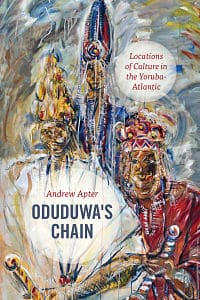 Andrew Apter, November 2017. Oduduwa’s Chain: Locations of Culture in the Yoruba-Atlantic. Chicago: University of Chicago Press. ISBN: 9780226506418
Andrew Apter, November 2017. Oduduwa’s Chain: Locations of Culture in the Yoruba-Atlantic. Chicago: University of Chicago Press. ISBN: 9780226506418
Yoruba culture has been a part of the Americas for centuries, brought from Africa during the transatlantic slave trade and maintained in various forms ever since. In Oduduwa’s Chain, Andrew Apter explores a wide range of fascinating historical and ethnographic examples and offers a provocative rethinking of African heritage in Black Atlantic Studies.
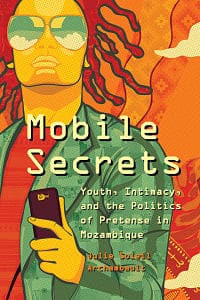 Archambault, Julie Soleil. 2017. Mobile Secrets: Youth, Intimacy and the Politics of Pretense in Mozambique. Chicago: University of Chicago Press. ISBN: 9780226447605
Archambault, Julie Soleil. 2017. Mobile Secrets: Youth, Intimacy and the Politics of Pretense in Mozambique. Chicago: University of Chicago Press. ISBN: 9780226447605
With Mobile Secrets, Julie Soleil Archambault offers a complete rethinking of how we understand uncertainty, truth, and ignorance by revealing how better access to information may in fact be anything but desirable. By engaging with young adults in a Mozambique suburb, Archambault shows how, in their efforts to create fulfilling lives, young men and women rely on mobile communication not only to mitigate everyday uncertainty but also to juggle the demands of intimacy by courting, producing, and sustaining uncertainty. In their hands, the phone has become a necessary tool in a wider arsenal of pretense—a means of creating the open-endedness on which harmonious social relations depend in postwar postsocialist Mozambique.
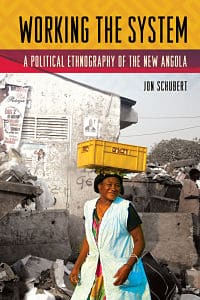 Schubert, Jon. 2017. Working the System: A political ethnography of the new Angola. Cornell University Press. ISBN: 9781501713699
Schubert, Jon. 2017. Working the System: A political ethnography of the new Angola. Cornell University Press. ISBN: 9781501713699
Working the System offers key insights into the politics of the everyday in twenty-first-century dominant party and neo-authoritarian regimes in Africa and elsewhere. Detailing the many ways ordinary Angolans fashion their relationships with the system—an emic notion of their current political and socioeconomic environment—Jon Schubert explores what it means and how it feels to be part of the contemporary Angolan polity.
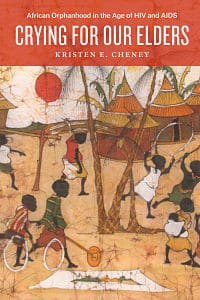 Kristen E. Cheney. March 2017. Crying for Our Elders: African Orphanhood in the Age of HIV and AIDS. University of Chicago Press. ISBN: 978022643754
Kristen E. Cheney. March 2017. Crying for Our Elders: African Orphanhood in the Age of HIV and AIDS. University of Chicago Press. ISBN: 978022643754
The HIV/AIDS epidemic in Africa has defined the childhoods of an entire generation. Over the past twenty years, international NGOs and charities have devoted immense attention to the millions of African children orphaned by the disease. But in Crying for Our Elders, anthropologist Kristen E. Cheney argues that these humanitarian groups have misread the ‘orphan crisis’. She explains how the global humanitarian focus on orphanhood often elides the social and political circumstances that actually present the greatest adversity to vulnerable children—in effect deepening the crisis and thereby affecting children’s lives as irrevocably as HIV/AIDS itself.
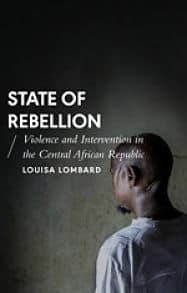 Lombard, Louisa. 2016. State of Rebellion. Violence and Intervention in the Central African Republic. Zed Books. ISBN: 9781783608843
Lombard, Louisa. 2016. State of Rebellion. Violence and Intervention in the Central African Republic. Zed Books. ISBN: 9781783608843
In 2013, the Central African Republic was engulfed by violence. In the face of the rapid spread of the conflict, journalists, politicians, and academics alike have struggled to account for its origins.
In this first comprehensive account of the country’s recent upheaval, Louisa Lombard shows the limits of the superficial explanations offered thus far – that the violence has been due to a religious divide, or politicians’ manipulations, or profiteering. Instead, she shows that conflict has long been useful to Central African politics, a tendency that has been exacerbated by the international community’s method of engagement with so-called fragile states. Furthermore, changing this state of affairs will require rethinking the relationships of all those present – rebel groups and politicians, as well as international interveners and diplomats.
An urgent insight into this little-understood country and the problems with peacebuilding more broadly.
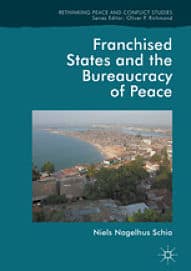 Nagelhus Schia, Niels. 2017. Franchised States and the Bureaucracy of Peace. Palgrave. ISBN: 978-3-319-65569-7
Nagelhus Schia, Niels. 2017. Franchised States and the Bureaucracy of Peace. Palgrave. ISBN: 978-3-319-65569-7
This book examines a new type of state formation evoked by the rise of transnational rule, what Schia calls franchised states. Drawing on anthropological studying-through fieldwork within the UN organization, he demonstrates how peacebuilding activities turned Liberia into an object of governing, whereby the UN, in seeking to build the state, also became the state. The sovereign state of Liberia here emerges as a franchise rather than a self-contained entity. Two implications follow: First, that international peacebuilding turns post-conflict countries into clients of the international community. Second, that “sovereignty” is no longer exclusively associated with the state: it is organized in and through specific practices of governing where a state actor is only one among a range of actors. With these findings, the book moves beyond previous work on peacebuilding by focusing on the unbundling of sovereignty. It contributes to the literature on the changing forms of sovereignty by showing the specific ways in which sovereignty is organized, packaged and enacted, often by actors working under international auspices.
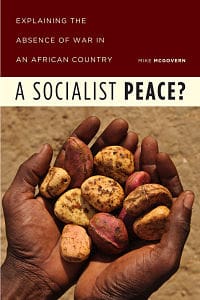 Mike McGovern, 2017. A Socialist Peace? Explaining the absence of war in an African country. University of Chicago Press. ISBN: 9780226453606
Mike McGovern, 2017. A Socialist Peace? Explaining the absence of war in an African country. University of Chicago Press. ISBN: 9780226453606
For the last twenty years, the West African nation of Guinea has exhibited all of the conditions that have led to civil wars in other countries, and Guineans themselves regularly talk about the inevitability of war. Yet the country has narrowly avoided conflict again and again. In A Socialist Peace?, Mike McGovern asks how this is possible, how a nation could beat the odds and evade civil war.
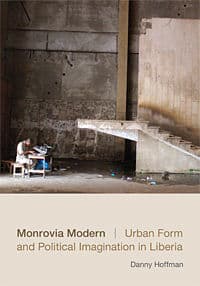 Danny Hoffmann. 2017. Monrovia Modern: Urban Forms and political imagination in Liberia. Duke UP. ISBN: 978-0-8223-5884-8
Danny Hoffmann. 2017. Monrovia Modern: Urban Forms and political imagination in Liberia. Duke UP. ISBN: 978-0-8223-5884-8
In Monrovia Modern Danny Hoffman uses the ruins of four iconic modernist buildings in Monrovia, Liberia, as a way to explore the relationship between the built environment and political imagination. Hoffman shows how the E. J. Roye tower and the Hotel Africa luxury resort, as well as the unfinished Ministry of Defense and Liberia Broadcasting System buildings, transformed during the urban warfare of the 1990s from symbols of the modernist project of nation-building to reminders of the challenges Monrovia’s residents face. The transient lives of these buildings’ inhabitants, many of whom are ex-combatants, prevent them from making place-based claims to a right to the city and hinder their ability to think of ways to rebuild and repurpose their built environment. Featuring nearly 100 of Hoffman’s color photographs, Monrovia Modern is situated at the intersection of photography, architecture, and anthropology, mapping out the possibilities and limits for imagining an urban future in Monrovia and beyond.
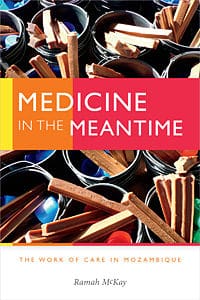 Ramah McKay. 2018. Medicine in the Meantime: The Work of Care in Mozambique. Duke UP. ISBN: 978-0-8223-7019-2
Ramah McKay. 2018. Medicine in the Meantime: The Work of Care in Mozambique. Duke UP. ISBN: 978-0-8223-7019-2
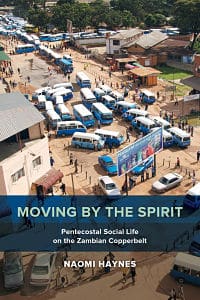 Naomi Haynes. 2017. Moving by the Spirit: Pentecostal Social Life on the Zambian Copperbelt. University of California Press. ISBN: 9780520294240
Naomi Haynes. 2017. Moving by the Spirit: Pentecostal Social Life on the Zambian Copperbelt. University of California Press. ISBN: 9780520294240Drawing on two years of ethnographic research, Naomi Haynes explores Pentecostal Christianity in the kind of community where it often flourishes: a densely populated neighborhood in the heart of an extraction economy. On the Zambian Copperbelt, Pentecostal adherence embeds believers in relationships that help them to “move” and progress in life. These efforts give Copperbelt Pentecostalism its particular local character, shaping ritual practice, gender dynamics, and church economics. Focusing on the promises and problems that Pentecostalism presents, Moving by the Spirit highlights this religion’s role in making life possible in structurally adjusted Africa.
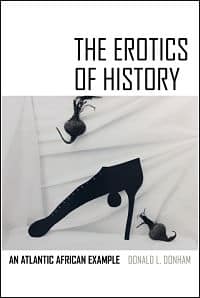 Donald Donham. 2018. The Erotics of History: An Atlantic African Example. University of California Press. ISBN: 9780520296312
Donald Donham. 2018. The Erotics of History: An Atlantic African Example. University of California Press. ISBN: 9780520296312
The Erotics of History challenges long-standing notions of sexuality as stable and context-free–as something that individuals discover about themselves. Rather, Donald L. Donham argues that historical circumstance, local social pressure, and the cultural construction of much beyond sex condition the erotic. Donham makes this argument in relation to the centuries-old conversation on the fetish, applied to a highly unusual neighborhood in Atlantic Africa. There, local men, soon to be married to local women, are involved in long-term sexual relationships with European men. On the African side, these couplings are motivated by the pleasures of cosmopolitan connection and foreign commodities. On the other side, Europeans tend to fetishize Africans’ race, while a few search to become slaves in master/ slave relationships. At its most wide ranging, The Erotics of History attempts to show that it is history, both personal and collective, in reversals and reenactments, that finally produces sexual excitement.
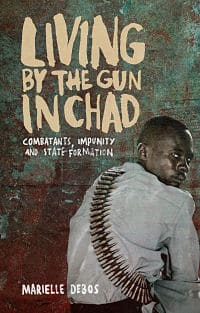 Debos, Marielle. 2016. Living by the Gun in Chad: Combatants, Impunity and State Formation. Zed Books. ISBN: 9781783605323
Debos, Marielle. 2016. Living by the Gun in Chad: Combatants, Impunity and State Formation. Zed Books. ISBN: 9781783605323
How do people live in a country that has experienced rebellions and state-organised repressions for decades and that is still marked by routine forms of violence and impunity? What do combatants do when they are not mobilised for war? Drawing on over ten years of fieldwork conducted in Chad, Marielle Debos explains how living by the gun has become both an acceptable form of political expression and an everyday occupation.
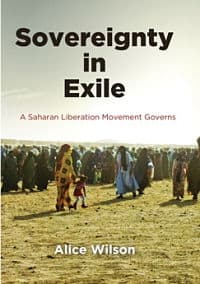 Wilson, Alice. 2016. Sovereignty in Exile. A Saharan Liberation Movement Governs. Penn Press. ISBN: 9780812248494. Received honorable mention in the 2017 American Anthropological Association Middle East Section Book Prize competition.
Wilson, Alice. 2016. Sovereignty in Exile. A Saharan Liberation Movement Governs. Penn Press. ISBN: 9780812248494. Received honorable mention in the 2017 American Anthropological Association Middle East Section Book Prize competition.
Sovereignty in Exile explores sovereignty and state power through the case of a liberation movement that set out to make itself into a state. The Sahrawi Arab Democratic Republic (SADR) was founded by the Polisario Front in the wake of Spain’s abandonment of its former colony, the disputed Western Sahara. Morocco laid claim to the same territory, and the conflict has locked Polisario and Morocco in a political stalemate that has lasted forty years. Complicating the situation is the fact that Polisario conducts its day-to-day operations in refugee camps near Tindouf, in Algeria, which house most of the Sahrawi exile community. SADR (a partially recognized state) and Polisario (Western Sahara’s liberation movement) together form an unusual governing authority, originally premised on the dismantling of a perceived threat to national (Sahrawi) unity: tribes.

